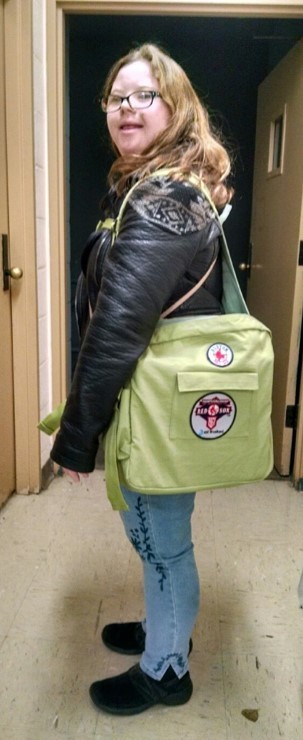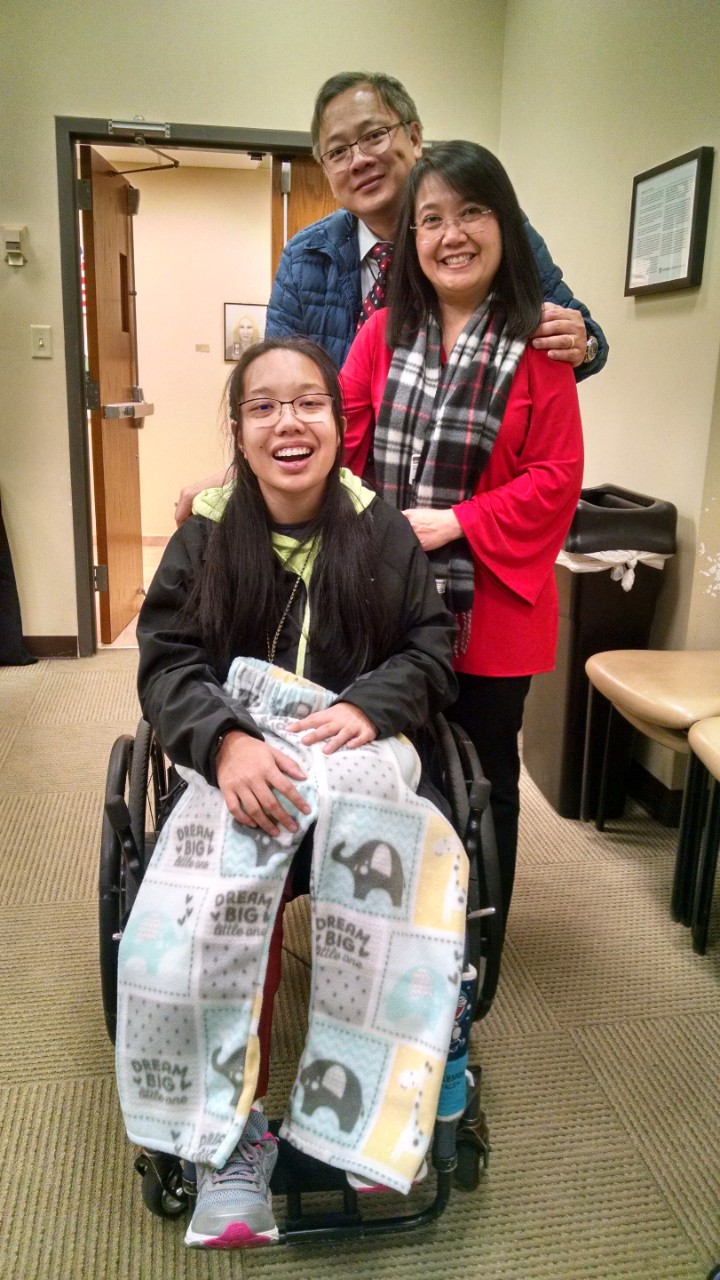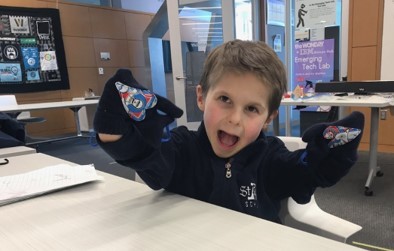Breaking Ground 105 Arts - Vanderbilt’s Adaptive Fashion Lab: Fashion, Friendship, Collaboration, and Inclusion
By Alexandra Sargent Capps, director of Vanderbilt University’s Wond’ry Innovation Center Fiber Arts LabFashion Empowers!
I believe fashion pieces that express who we are can empower people of all ages and abilities. What better way to build autonomy and confidence for people with physical disabilities than through customized fashion pieces and accessories?
A fashion lab to do just that is growing out of a series of experiences with Vanderbilt students.
First: What is Adaptive Fashion?
Adaptive fashion is clothing designed specifically for people with disabilities who have difficulty dressing independently or who have sensory issues and sensitivities to certain textures and materials.
The Idea
Olivia Murry is a student in Vanderbilt University's Next Steps program. Next Steps at Vanderbilt is an inclusive higher education program for students with intellectual and developmental disabilities. In the spring of 2018, Olivia took my History of Fashion class. She describes the start of her wonderful friendship with Courtney Lane, a traditional Vanderbilt student, this way: “I met Courtney on our first day of Fashion History class when we both arrived twenty minutes early. From then on, we sat together every day, and did all our class projects and presentations together. All semester we were empowered by our friendship.”
From great friendships come great ideas. For their final class project, Olivia and Courtney created an adaptive fashion company. The project inspired our whole class, because their vision supports the creation of a more inclusive world. Their goals for the company were:
- Design and sell inclusive and adaptable clothing through partnering with already existing companies.
- Allow all people to feel confident and comfortable in what they wear!
- Give the profits to Best Buddies (organization dedicated to creating friendships among people with and without disabilities).
- Include custom jewelry made by Olivia, who had already been learning the skill with her dad.
Creating the First Piece of Adaptive Fashion
The next semester, Olivia took my Costume Design course. Olivia often complained about back pain, due to the heavy backpack she carries all over campus. Olivia has Down syndrome, which is often accompanied by scoliosis and back pain. I decided that it was time to put Olivia and Courtney’s idea of adaptive fashion into action.
To explore and test how form and function need to work together for stage costumes, the first class project was to design and produce a better backpack for Olivia. We discovered the BackTPack, designed by a physical therapist. It moves backpack pressure to the sides of the body. We purchased the bag and made adjustments so that it fit Olivia perfectly. The backpack did relieve Olivia’s back pain. Olivia requested that we decorate it with patches from her favorite sports teams from her hometown of Boston so that it reflected her personal style.
Olivia taught our class that functional fashion and accessories can help make the day easier and less painful, and that expressing one’s personality through clothing and accessories builds confidence.
More Adaptive Fashion: A Bag for Peach!
Because of the success of Olivia’s backpack, I met with Peach Chinratanalab, a Next Steps student who uses a wheelchair. Peach and her parents were very excited about working with our developing lab to design a bag that would serve her specific needs, including:
- sitting comfortably on her lap.
- having her phone and wallet easily accessible.
- being waterproof.
- using a zipper closure that pulls in the correct direction to serve her stronger hand.
Peach’s parents mentioned that her legs get cold and wet in bad weather. So, we added a zipper to the underside of the bag, with a zip-on-zip-off rain tarp and fleece blanket. Peach LOVES color and pattern, because they match her sparkly personality. So, making the bag in a bright, bold, fun pattern was essential. Collaborating with Peach and her parents to design a number of items, including the bag and some customized well-fitting pants, was a fun and rewarding process.



The Next Step in Creating the Adaptive Fashion Lab
Last summer, I reached out to Lindsay Krech, the Next Steps Co-Director of Career Development to ask for help to further realize Olivia and Courtney’s original idea. Lindsay gathered an amazing team to take part in a fall 2020 internship, with a goal of developing the mission for the adaptive fashion lab. The team included two Next Steps students, Rachel Williams and Lydia Young, and two students from Vanderbilt’s Peabody School of Special Education, Emily Hong and Annie Kaplan. I am so proud of the work and ideas produced by this wonderful team.
Below, in their own words, is some of their important work:
- Lydia: We conducted personal interviews with people who have physical disabilities. We found that having accessible clothing would give people with disabilities more confidence and improve their self-esteem, as well as encourage autonomy and independence. In our interviews, we got these responses:
- Cassidy: “Not asking people for help would encourage self-esteem.”
- Connor: “Some people with physical disabilities have trouble with the buttons on their shirt. I would like to have accessible buttons.”
- Rachel: Through surveys we created and sent out, we found that:
- 88% of people with physical disabilities have some sort of difficulty putting on clothes.
- 100% of people said that their clothing should address special physical and accessibility needs.
The mission statement these students wrote perfectly captures the big ideas and goals for the adaptive fashion lab:
- Rachel: Our mission statement is:
The Adaptive Fashion Lab will create one of a kind clothing and accessories for people with physical disabilities and sensory sensitivities of any age or gender. The Adaptive Fashion Lab encourages autonomy and independence for individuals with disabilities.
- Lydia: The Adaptive Fashion Lab will offer many services:
- Adapt clothing that people already own
- Make one-of-a-kind specialized clothing and accessory items from scratch
- Teach people how to adapt their own clothing
I am thrilled with the accomplishments of the fall internship team. Their research and discoveries show that the adaptive fashion lab has the potential to help many people.
Rachel and Lydia Bring a New Project: Mittens for Hugh
Rachel and Lydia’s internship outreach efforts got the lab in touch with adorable, six-year-old Hugh Lang, who was born with club hands and no thumbs. Hugh uses his pinkies like other people use their thumbs. Hugh came to the lab with his dad, Matt. He needed, among other things, a custom-fitted pair of mittens. Hugh spent his time at the lab drawing pictures of Star Wars characters! Clearly, any fashion pieces for Hugh will be a hit if they include Star Wars.
Making mittens for Hugh required 1) tracing his hands in order to make a pattern so that the mittens would fit, and 2) figuring out, with the help of his dad, where to add loops so he can take them on and off himself. I made Hugh’s mittens out of a recycled, felted cashmere sweater, with hearts on them made from cotton Star Wars fabric. Matt sent me a note saying: “Hugh loves his mittens. He wore them today. They really give him the ability to do things and play outside. He used to get cold fast and not be able to use his hands. THANK YOU!!!”
Olivia and Courtney Had a Great Idea!
Next Steps students have proven that Olivia and Courtney were right: there is a lot of need for adaptive clothing and accessories for people with physical disabilities. Because of all these students’ ideas and efforts, building empowerment and inclusivity for everyone connected to Vanderbilt’s Adaptive Fashion Lab is becoming an exciting reality!
Information about the Adaptive Fashion Lab
The Vanderbilt Adaptive Fashion Lab will be located in an accessible space at the Fiber Arts Lab at Vanderbilt’s Wond’ry Center for Innovation. The staff will include people with physical and intellectual disabilities, who will be involved in all aspects of the design and production process, including taking notes, reaching out to clients to schedule appointments and asking them about their needs, choosing fabrics and supplies, brainstorming solutions, conducting surveys, and keeping track of tasks. The staff will work with clients at the lab to help them playfully and creatively express themselves through artwork to illuminate the client’s favorite colors and patterns, which will then be applied to their customized fashion pieces.
Alex is the University costume designer, costume shop manager, and director of Vanderbilt’s Wond’ry Innovation Center Fiber Arts Lab. She teaches classes in costume design, fashion history, and fashion sustainability. Alex holds a B.A. in Theatre from Middlebury College, and an MFA in Stage Design from Northwestern University.